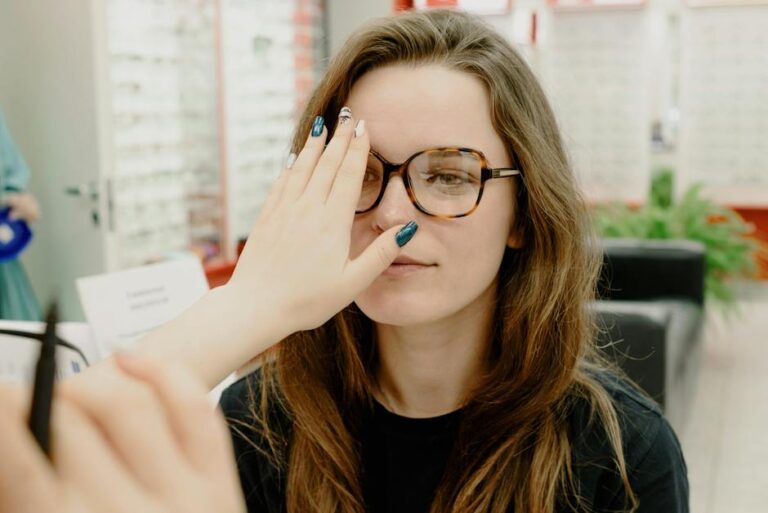5 Simple Habits to Keep Your Eyes Healthy and Bright
In our fast-paced digital world, it’s important to prioritize our eye health. The good news is that maintaining healthy and bright eyes doesn’t have to be a complicated task. By practicing simple habits like taking regular breaks from screens, eating a balanced diet, keeping our eyes clean, protecting them from the sun, and getting enough sleep, we can ensure our eyes stay in top shape. Let’s find out in detail in the article below how these habits can benefit our eye health. Let’s find out exactly what we need to do to keep our eyes bright and healthy. I’ll tell you exactly!
Daily Habits for Maintaining Eye Health
Our eyes are one of the most important organs in our body, allowing us to see and experience the world around us. With the continuous use of digital screens and exposure to various environmental factors, it’s crucial to prioritize our eye health. Fortunately, there are simple habits that we can incorporate into our daily routine to maintain healthy and bright eyes. Let’s explore these habits in detail:
1. Take Regular Breaks from Screens
Many of us spend hours staring at screens, whether it be for work or leisure activities. Prolonged screen time can lead to eye strain and dryness, known as computer vision syndrome. To prevent this, it’s essential to take regular breaks throughout the day. The 20-20-20 rule can be followed, which involves looking away from the screen every 20 minutes and focusing on an object at least 20 feet away for 20 seconds. This practice allows our eyes to rest and reduces strain.
In addition to taking breaks, adjusting the screen brightness and reducing glare can also alleviate eye strain. Positioning the screen slightly below eye level and maintaining a clean screen can also help reduce eye fatigue.
2. Eat a Balanced Diet
Your diet plays a significant role in maintaining eye health. Consuming a variety of foods rich in vitamins, minerals, and antioxidants can protect your eyes and reduce the risk of developing age-related eye conditions. Include the following nutrients in your diet:
- Omega-3 fatty acids: Found in fatty fish like salmon, tuna, and sardines, omega-3 fatty acids promote proper visual development and help prevent dry eyes.
- Vitamin C: Citrus fruits, berries, and leafy greens are excellent sources of vitamin C, which helps maintain the health of blood vessels in the eyes.
- Vitamin E: Nuts, seeds, and spinach are rich in vitamin E, which protects the eye tissues from oxidative damage.
- Lutein and zeaxanthin: These antioxidants are found in yellow and green vegetables like spinach, kale, and corn. They help filter harmful blue light and reduce the risk of macular degeneration.
Add these nutrient-rich foods to your diet to support your overall eye health.
3. Keep Your Eyes Clean
Maintaining proper eye hygiene is crucial for preventing infections and other eye-related complications. Here are some simple practices to keep your eyes clean:
- Wash your hands: Before touching your eyes or applying any eye products, make sure to wash your hands thoroughly with soap and water.
- Remove eye makeup: Always remove your eye makeup before going to bed to prevent eye irritation and infections.
- Avoid touching your eyes: Refrain from touching or rubbing your eyes to avoid transferring bacteria or irritants to them.
- Use clean towels and pillows: Regularly wash your towels, pillowcases, and other fabrics that come in contact with your eyes to keep them free from bacteria.
By practicing good eye hygiene, you can reduce the risk of eye infections and maintain optimal eye health.
4. Protect Your Eyes from the Sun
Exposure to harmful UV rays can cause various eye problems, including cataracts, macular degeneration, and eye sunburn. To shield your eyes from the sun, follow these steps:
- Wear sunglasses: Look for sunglasses that offer 100% UV protection. Ensure they cover both the front and sides of your eyes to block out harmful rays.
- Wear a hat: Pair your sunglasses with a wide-brimmed hat for added protection from the sun’s rays.
- Avoid peak sunlight hours: Limit your outdoor activities during the brightest hours of the day when the sun’s rays are the strongest.
By taking these precautions, you can significantly reduce the potential damage caused by the sun and maintain the health of your eyes.
5. Get Enough Sleep
Sleep is essential for overall health, including the well-being of our eyes. Lack of sleep can lead to eye fatigue, dryness, and even impaired vision. Aim for the recommended 7-8 hours of sleep each night to promote eye health.
Creating a relaxing sleep environment, avoiding screens before bedtime, and using a humidifier to combat dry indoor air can aid in a good night’s sleep. Additionally, consider adding eye drops or using a warm compress to soothe tired eyes.
By prioritizing enough sleep, you can give your eyes the rest they need to function optimally.
Conclusion
Maintaining healthy and bright eyes is vital in our screen-filled digital world. By incorporating simple habits like taking breaks from screens, following a balanced diet, practicing good eye hygiene, protecting our eyes from the sun, and getting enough sleep, we can safeguard our eye health. Remember to make these habits a part of your daily routine for the long-term well-being of your precious eyes.
Additional information
1. Regular eye check-ups: It is important to visit an eye doctor regularly to assess the health of your eyes and detect any underlying issues. Regular check-ups can help prevent and manage eye conditions.
2. Stay hydrated: Drinking an adequate amount of water can prevent dry eyes and maintain overall eye health. Aim to drink at least 8 glasses of water per day.
3. Quit smoking: Smoking can increase the risk of developing cataracts and age-related macular degeneration. By quitting smoking, you can reduce the chances of these eye conditions.
4. Exercise regularly: Engaging in regular physical activity improves blood flow to the eyes and can help prevent age-related eye diseases. Aim for at least 30 minutes of exercise most days of the week.
5. Use proper lighting: Ensure that your working and living environments have adequate lighting to prevent eye strain. Avoid working or reading in dimly lit areas.






